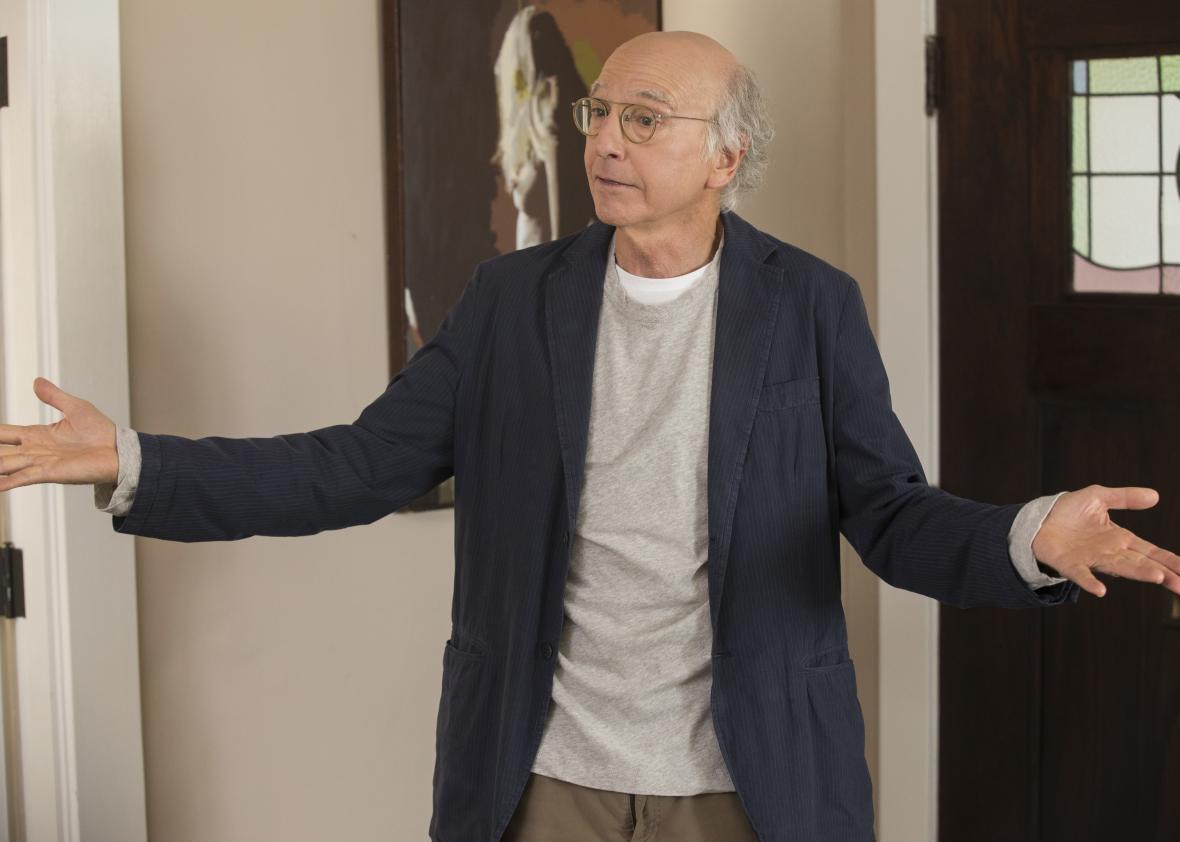Today at sundown, Jews begin the observance of Yom Kippur, the Day of Atonement that signals the end of the High Holy Days, a cycle marked by reflection and apologies to the people we have wronged in the last year. While the faithful may spend all Saturday fasting or repenting in temple, the following day marks the homecoming of a modern day Jewish folk hero—one who never says sorry.
Curb Your Enthusiasm, whose long-awaited ninth season begins on Sunday, has been promoted with an ad campaign framing Larry David’s return in superheroic terms, complete with his own Bat Signal and a voiceover calling him “one hero who never stays silent—who fights against injustice wherever he finds it.” But, like Batman’s, David’s vigilante push for justice rubs some the wrong way. Call in a line of character witnesses a la the Seinfeld finale, and he’d get the same judgment as Jerry, George, Elaine, and Kramer: an indictment. Larry’s a putz, a schleimiel, and a buttinsky, a sanctimonious pest committed to breaking commitments and enforcing his own idiosyncratic version of the social contract. Still, his motives are heroic, even if his tactics fall short of nobility.
Curb’s fictional Larry is a caricature of his creator’s real personality, but he nonetheless embodies a real yen in David—and his prototype, George Costanza, whom the fictional Larry frequently finds himself defending—to overcorrect in service of the social contract. To quote George’s Seinfeld cri de coeur, “You know we’re living in a society!” Indeed we are, and Larry’s mission of societal reform aligns with the precept of tikkun olam, the Jewish obligation to “repair the world” by exemplifying a moral code.
Like the old Hershel folk stories, Larry’s cringe-worthy travails are watchable because we’re often sympathetic to the aims of his crusade. Holistically, he desires a world where people don’t take unfair advantage, whether it’s of an accidentally doubled Christmas tip, a stolen shrimp from Chinese takeout, or by deploying the infamous “chat and cut.” But where most of us might let these things slide, Larry sees it as his burden to be a moral voice—the guy who, at least to his mind, says what everyone else is thinking. The catch is that in his indignation, he’s blind to the times when his manner of making things right becomes worse than the initial offense.
Larry gives no quarter to ambiguity or benefit of the doubt. Was Michael J. Fox stomping around the floor above him as a means of revenge? Even if he were, it’s not politic to mention it, certainly not to the board of a building naturally sympathetic to a long-time resident with Parkinson’s. Larry may have had a legitimate gripe when, after being generously granted a small easement of storage space, his officemate Big Dog annexed all but one cabinet—but Larry shouldn’t have called his secretary away from her father’s deathbed to resolve the matter.
Larry has been party to such classic mitzvahs as sheltering a family displaced by Hurricane Katrina, but his now-ex-wife Cheryl tended to lead the charge. Larry’s focus is less global and more concerned with reducing temporary inconvenience and discomfort; his version of saving the planet is making sure fellow Prius drivers salute each other with a customary wave. Larry was the one to buy their houseguests a better quality toilet paper than Cheryl’s preferred environmentally friendly brand, mostly because he might end up using their bathroom some time.
Larry believes people would do better by holding true to a standard of fairness—one whose ins and outs only he knows. He quibbles with the bad Lakers seats he’s given by an NBC exec (though it’s possible, after tripping Shaq, he was too much of a liability for courtside); he objects to Ben Stiller’s suggestion that “no birthday gifts” really means gifts; and equivocates endlessly on his decision to give his oldest friend a kidney. Even when Larry thoughtfully gives Ted Danson a stylish shirt, he sullies the gesture by insisting that Danson return it himself after he discovers a small hole in the fabric. In giving the gift, Larry reasons, he transferred both its ownership and the responsibility for mending it, a dodge that echoes the Hebrew God’s logic in appointing Jews the world’s moral repairmen. But however stubborn Larry’s objections may be, wouldn’t we all like to get the treatment he expects: the best seats, people who are true to their word, no expectation of nobility, no additional errands to run?
Larry’s altruistic boorishness is offset by the occasional noble thought, like sneaking his limo driver into a party at Danson’s house instead of making him wait outside. But he misses the bigger part of tikkun olam. At its core it’s about setting an example, not dictating one. We are charged with taking the Danson shirt back ourselves, not just giving him the directions to the store. But as with all things Talmudic, this is subject to debate.
What we’ll make of Larry in the Trump era is an open question. We now have a leader whose brand is pettiness and calling it like he sees it. The schtick may be tired in Curb’s context, especially with Larry’s spotty record on race and with women. But whatever their similarities in effect, Larry’s philosophy, however flawed, encompasses consideration, common courtesy, and, often, empathy. He’d be at the back of a crowd at the G-20, lecturing Trump for muscling his way to the front. But then surely, in the president’s deluded mind, he’s setting the world right too.
